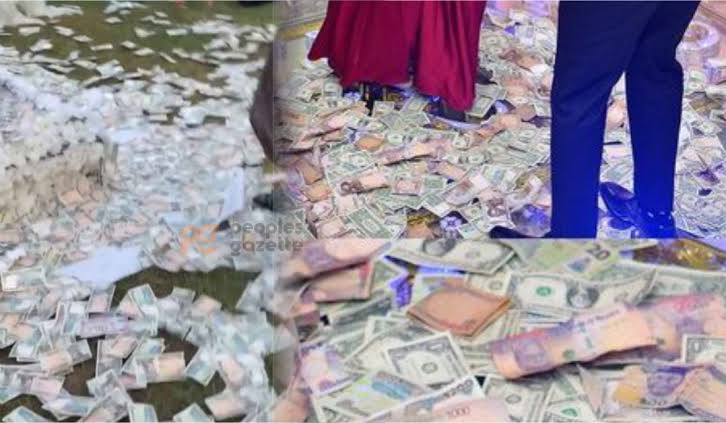What the Law Says About Spraying Money in Nigeria
Spraying money at weddings, birthdays, and other celebrations has become a common sight in Nigeria. For many people, it is a way to show happiness, honour the celebrant, and display generosity. In fact, the practice has become so popular that many Nigerians now see it as part of their culture.
But what many do not know is that spraying money is against the law in Nigeria, and those who engage in it risk serious punishment.
What the Law Says
The Central Bank of Nigeria (CBN) Act, 2007, Section 30, makes it an offence to damage, deface, or abuse the naira in any way without permission from the CBN. The Act clearly states:
“Any person who, without the authority of the Central Bank of Nigeria, destroys, defaces, disfigures or otherwise damages any currency note or coin in Nigeria shall be guilty of an offence and shall on conviction be liable to a fine of ₦50,000 or imprisonment for two years or both.”
Since spraying money usually leads to notes being trampled, torn, or soiled, the law classifies it as currency abuse.
Penalties for Spraying Money
Anyone found guilty of spraying money at events faces:
-
A fine of ₦50,000,
-
Up to two years in prison, or
-
Both fine and imprisonment.
Several high-profile Nigerians, including celebrities and socialites, have been prosecuted for breaking this law.
Why the Practice Is Illegal
The CBN banned spraying money for several reasons:
-
To protect the naira from damage,
-
To save government costs spent on replacing damaged notes,
-
To preserve the dignity of the currency as a symbol of national identity.
No Excuse in Court
Ignorance of the law is not a defence. In a landmark case (Adefarasin v. Attorney General of the Federation, 1995), the Supreme Court ruled that all citizens are presumed to know the law. This means anyone caught spraying money cannot escape punishment by claiming they didn’t know it was illegal.
Safer Alternatives
Nigerians can still celebrate in meaningful ways without breaking the law. Some alternatives include:
-
Gifting money in envelopes,
-
Sending bank transfers to celebrants,
-
Giving useful presents instead of cash,
-
Donating to charity in honour of the celebrant.
Conclusion
While spraying money remains a colourful part of Nigerian parties, it is illegal under Nigerian law. The CBN’s message is clear: the naira must be treated with respect. By adopting safer and lawful alternatives, Nigerians can continue to celebrate in style without facing fines or jail time.
FAQs on Spraying Money in Nigeria
1. Is spraying money at weddings illegal in Nigeria?
Yes. Spraying money at weddings, birthdays, and other events is considered illegal under the Central Bank of Nigeria (CBN) Act 2007 because it defaces the naira.
2. What is the punishment for spraying money in Nigeria?
The penalty for spraying money in Nigeria includes a fine of ₦50,000, two years in prison, or both fine and imprisonment.
3. Why did the CBN ban spraying money at parties?
The CBN banned spraying money to protect the naira from damage, reduce government costs of replacing notes, and maintain the currency’s dignity.
4. Can ignorance of the law protect me if I spray money?
No. Nigerian law follows the principle that “ignorance is not a defence.” Anyone caught spraying money will be punished regardless of whether they knew it was illegal.
5. What are legal alternatives to spraying money in Nigeria?
Instead of spraying money, celebrants and guests can give money in envelopes, use bank transfers, give gifts, or make charity donations in honour of the celebrant.
6. Have celebrities been arrested for spraying money in Nigeria?
Yes. Several Nigerian celebrities and socialites, including Bobrisky and Cubana Chief Priest, have been arrested and fined for abusing the naira by spraying at events.






















